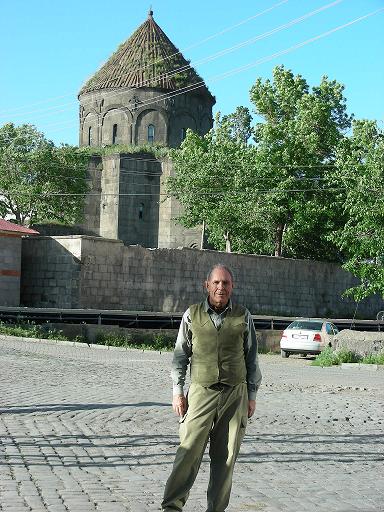 Albert Schweitzer (14 January 1875 – 4 September 1965) was a Franco-German (Alsatian) theologian, organist, philosopher, physician, and medical missionary. He was born in Kaysersberg in the province of Alsace-Lorraine, in the German Empire. Schweitzer challenged both the secular view of Jesus as depicted by historical-critical methodology current at his time in certain academic circles, as well as the traditional Christian view, depicting a Jesus Christ who expected and predicted the imminent end of the world. He received the 1952 Nobel Peace Prize for his philosophy of "Reverence for Life",[1] expressed in many ways, but most famously in founding and sustaining the Albert Schweitzer Hospital in Lambaréné, now in Gabon, west central Africa (then French Equatorial Africa). As a music scholar and organist, he studied the music of German composer Johann Sebastian Bach and influenced the Organ reform movement (Orgelbewegung). Albert Schweitzer (14 January 1875 – 4 September 1965) was a Franco-German (Alsatian) theologian, organist, philosopher, physician, and medical missionary. He was born in Kaysersberg in the province of Alsace-Lorraine, in the German Empire. Schweitzer challenged both the secular view of Jesus as depicted by historical-critical methodology current at his time in certain academic circles, as well as the traditional Christian view, depicting a Jesus Christ who expected and predicted the imminent end of the world. He received the 1952 Nobel Peace Prize for his philosophy of "Reverence for Life",[1] expressed in many ways, but most famously in founding and sustaining the Albert Schweitzer Hospital in Lambaréné, now in Gabon, west central Africa (then French Equatorial Africa). As a music scholar and organist, he studied the music of German composer Johann Sebastian Bach and influenced the Organ reform movement (Orgelbewegung).
Schweitzer's passionate quest was to discover a universal ethical philosophy, anchored in a universal reality, and make it directly available to all of humanity.[2][3]
Education
Born in Kaysersberg, Schweitzer spent his childhood in the village of Gunsbach, Alsace (German: Günsbach), where his father, the local Lutheran-Evangelical pastor, taught him how to play music.[4] Long disputed, the predominantly German-speaking region of Alsace or Elsaß was annexed by Germany in 1871; after World War I, it was reintegrated into France. The tiny village is home to the Association Internationale Albert Schweitzer (AIAS).[5] The medieval parish church of Gunsbach was of a special Protestant-Catholic kind found in various places in Germany even today. It was shared by the two congregations, which held their prayers in different areas of the same church at different times on Sundays. This compromise arose after the Protestant Reformation and the Thirty Years War. Schweitzer, the pastor's son, grew up in this exceptional environment of religious tolerance, and developed the belief that true Christianity should always work towards a unity of faith and purpose.[6]
Read more...
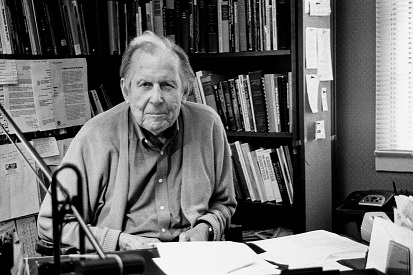 Thomas Berry, C.P. (November 9, 1914 – June 1, 2009) was a Catholic priest of the Passionist order, cultural historian and ecotheologian (although cosmologist and geologian — or “Earth scholar” — were his preferred descriptors). Thomas Berry, C.P. (November 9, 1914 – June 1, 2009) was a Catholic priest of the Passionist order, cultural historian and ecotheologian (although cosmologist and geologian — or “Earth scholar” — were his preferred descriptors).
Among advocates of deep ecology and "ecospirituality" he is famous for proposing that a deep understanding of the history and functioning of the evolving universe is a necessary inspiration and guide for our own effective functioning as individuals and as a species. He is considered a leader in the tradition of Teilhard de Chardin.
Author Michael Colebrook describes two key elements in Thomas Berry’s thinking: “Firstly, the primary status of the universe. The universe is, ‘the only self-referential reality in the phenomenal world. It is the only text without context. Everything else has to be seen in the context of the universe’. The second element is the significance of story, and in particular the universe as story. ‘The universe story is the quintessence of reality. We perceive the story. We put it in our language, the birds put it in theirs, and the trees put it in theirs. We can read the story of the universe in the trees. Everything tells the story of the universe. The winds tell the story, literally, not just imaginatively. The story has its imprint everywhere, and that is why it is so important to know the story. If you do not know the story, in a sense you do not know yourself; you do not know anything.’”.
Read more...
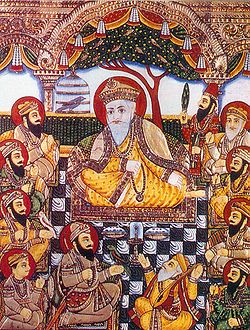 Guru Nanak [1] (Punjabi: ਗੁਰੂ ਨਾਨਕ, Hindi: गुरु नानक, Urdu: گرونانک Guru Nānak) (15 April 1469 – 22 September 1539) was the founder of the religion of Sikhism and the first of ten Sikh Gurus. Sikhs believe that all subsequent Gurus possessed Guru Nanak’s divinity and religious authority. Guru Nanak [1] (Punjabi: ਗੁਰੂ ਨਾਨਕ, Hindi: गुरु नानक, Urdu: گرونانک Guru Nānak) (15 April 1469 – 22 September 1539) was the founder of the religion of Sikhism and the first of ten Sikh Gurus. Sikhs believe that all subsequent Gurus possessed Guru Nanak’s divinity and religious authority.
Biography
Early life
Guru Nanak Dev was born on 15 April 1469,[2] now celebrated as Prakash Divas of Guru Nanak Dev, into a Bedi Kshatriya family in the village of Rāi Bhōi dī Talwandī, now called Nankana Sahib, near Lahore, Pakistan.[3] Today, his birthplace is marked by Gurdwara Janam Asthan. (Some are of the opinion that 20 October is his enlightenment day rather than his birthday.) His father, Mehta Kalyan Das Bedi, popularly shortened to Kalu Mehta,[4] was the patwari (accountant) of crop revenue for the village of Talwandi in the employmenty of a Muslim landlord of that area, Rai Bular Bhatti.[5] Guru Nanak’s mother was Tripta Devi and he had one elder sister, Bebe Nanaki.
Nanaki married Jai Ram and went to his town of Sultanpur, where he was the steward (modi) to Daulat Khan Lodi, the eventual governor of Lahore. Guru Nanak was attached to his older sister, and, in a traditional Indian fashion, he followed her to Sultanpur to live with her and Jai Ram. Guru Nanak also found work with Daulat Khan, when he was around 16 years old. This became a formative time for Guru Nanak, as the Puratan Janam Sakhi suggests, and as evidenced in his numerous allusions to governmental structure in his hymns, most likely gained at this time. [6]
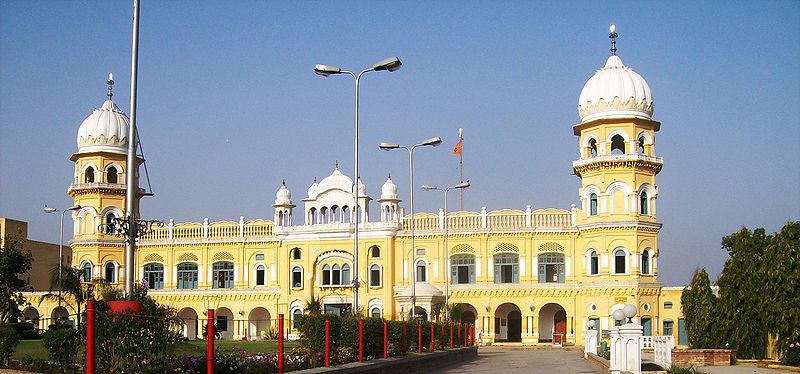 Gurdwara Nankana Sahib, Pakistan Gurdwara Nankana Sahib, Pakistan
Read more...
Turkey's Changemakers: Victor Ananias helps establish organic farming methods
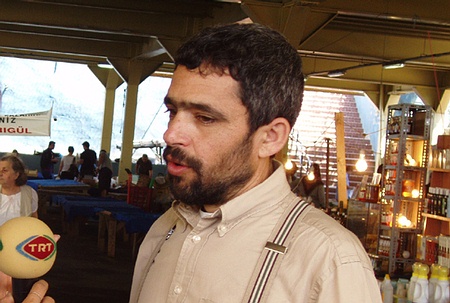 Sabanci Foundation's "Turkey's Changemakers" TV program shares inspiring stories of individuals who make a difference in social and economic development. Sabanci Foundation's "Turkey's Changemakers" TV program shares inspiring stories of individuals who make a difference in social and economic development.
The 15th episode of Sabanci Foundation's "Turkey's Changemakers" tells the story of Victor Ananias.
Victor Ananias is a son of a Chilean father and Turkish mother and he was grown up in a small village at the Aegean coast of Turkey. He has been working to introduce organic agriculture to Turkey for 17 years. In this respect, he has established partnerships with several NGOs, leading to many new ecological practices. He also worked to design and implement integrated projects and promoted organic products. Ananias is a world known pioneer of the ecological movement and he is shown as one of five future leaders by international ecological agriculture agencies. He was also awarded an Ashoka Fellowship in 2000.
Read more...
 Christopher Alexander (born October 4, 1936 in Vienna, Austria) is an architect noted for his theories about design, and for more than 200 building projects in California, Japan, Mexico and around the world. Reasoning that users know more about the buildings they need than any architect could, he produced and validated (in collaboration with Sarah Ishikawa and Murray Silverstein) a "pattern language" designed to empower anyone to design and build at any scale. In 1958 he moved from England to the United States, living and teaching in Berkeley, California from 1963. He is professor emeritus at the University of California, Berkeley. Now retired (though ceaselessly active), he is based in Arundel, Sussex, UK. Christopher Alexander (born October 4, 1936 in Vienna, Austria) is an architect noted for his theories about design, and for more than 200 building projects in California, Japan, Mexico and around the world. Reasoning that users know more about the buildings they need than any architect could, he produced and validated (in collaboration with Sarah Ishikawa and Murray Silverstein) a "pattern language" designed to empower anyone to design and build at any scale. In 1958 he moved from England to the United States, living and teaching in Berkeley, California from 1963. He is professor emeritus at the University of California, Berkeley. Now retired (though ceaselessly active), he is based in Arundel, Sussex, UK.
Education
Alexander grew up in England and started his education in sciences. In 1954, he was awarded the top open scholarship to Trinity College, Cambridge University in chemistry and physics, and went on to read mathematics. He earned a Bachelor's degree in Architecture and a Master's degree in Mathematics. He took his doctorate at Harvard (the first Ph.D. in Architecture ever awarded at Harvard University), and was elected fellow at Harvard. During the same period he worked at MIT in transportation theory and in computer science, and worked at Harvard in cognition and cognitive studies.
Honors
Alexander was awarded the First Gold Medal for Research by the American Institute of Architects in 1972. He was awarded the Seaside Prize in 1994. He was elected Fellow of the American Academy of Arts and Sciences in 1996 for his contributions to architecture. In 2006 he was one of the two inaugural recipients of the Athena Award, given by the Congress for the New Urbanism (CNU). On 5 November 2009, at a ceremony in Washington D.C., he was awarded (in absentia) the Vincent Scully Prize.
Read more...
 CV of Professor Muhammad Yunus CV of Professor Muhammad Yunus
Bio-Data of Professor Muhammad Yunus Managing Director, Grameen Bank Dhaka, Bangladesh
Personal Information
|
Name
Present Address
Date of Birth
Marital Status
Nationality
Education
|
PROFESSOR MUHAMMAD YUNUS
Managing Director
Grameen Bank, Mirpur-2
Dhaka 1216, Bangladesh
Phone no: 880 2-801-1138
Fax: 880 2 801-3559
E-mail:
This e-mail address is being protected from spambots. You need JavaScript enabled to view it
Website: www.grameen.com
June 28, 1940
Married
Bangladeshi
Ph.D in Economics, Vanderbilt University, U.S.A.(1970)
|
Scholarships / Fellowships
- Awarded Fulbright Fellowship to study in the U.S.A. for 1965-66.
- Awarded Vanderbilt University research and teaching fellowships during 1966-69.
- Awarded Eisenhour Exchange Fellowship for 1984.
- Senior Fellow, The Institute of Mediterranean Studies,Universita della Svizzera Italiana, Lugano, Switzerland (2000 - ).
Read more...
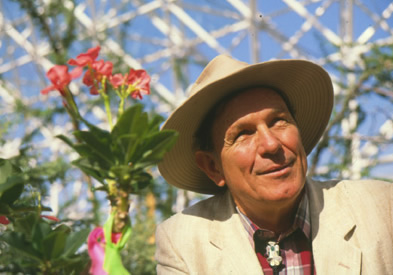 Johnny Dolphin is the nom de plume of John Allen - explorer, author, poet, playwright, scientist, - in 1963 he gave up his New York international project development career to make a two year journey around the world living with the legendary avant-garde and Berber scene in Tangiers, Morocco, then continued dressed as an Arab hiking and hitch-hiking across N. Africa to the Pyramids and Karnak to study the origins of civilization. Deciding to move toward the tribal areas and explore the area of the origins of humanity, he traveled up the Nile, with tribal chiefs and shaman from the South Sudan to Lake Victoria, then journeyed on through Uganda, Kenya, to the sacred Zambezi, then returned north to stay in Swahili Mombasa before taking third class passage with refugees to the Rann of Kutch. From there he wandered through the physical and metaphysical realms of Hindu Karma yogins and Tibetan Lamas. Then he encountered America again working as a stringer to a foreign correspondent and in a hospital on the Ho Chi Minh trail. Though he had published some poetry before, he emerged as an accomplished author with the first book of his authoritative Novel of the Sixties, "Thirty-Nine Blows on a Gone Trumpet". Since then, he has chronicled a personal and social history of the essence of the places he has been through novels, poetry, short stories and plays. Johnny Dolphin is the nom de plume of John Allen - explorer, author, poet, playwright, scientist, - in 1963 he gave up his New York international project development career to make a two year journey around the world living with the legendary avant-garde and Berber scene in Tangiers, Morocco, then continued dressed as an Arab hiking and hitch-hiking across N. Africa to the Pyramids and Karnak to study the origins of civilization. Deciding to move toward the tribal areas and explore the area of the origins of humanity, he traveled up the Nile, with tribal chiefs and shaman from the South Sudan to Lake Victoria, then journeyed on through Uganda, Kenya, to the sacred Zambezi, then returned north to stay in Swahili Mombasa before taking third class passage with refugees to the Rann of Kutch. From there he wandered through the physical and metaphysical realms of Hindu Karma yogins and Tibetan Lamas. Then he encountered America again working as a stringer to a foreign correspondent and in a hospital on the Ho Chi Minh trail. Though he had published some poetry before, he emerged as an accomplished author with the first book of his authoritative Novel of the Sixties, "Thirty-Nine Blows on a Gone Trumpet". Since then, he has chronicled a personal and social history of the essence of the places he has been through novels, poetry, short stories and plays.
John Allen, inventor and co-founder of the Biosphere 2 project - the world’s largest laboratory for global ecology. Biosphere 2 set a number of world records in closed life system work including, among others, degree of sealing tightness, 100% waste recycle and water recycle, and duration of human residence within a closed system (8 people for two years -- see www.biospherics.org ). Allen began the first manned Biosphere Test Module experiment in September, 1988, residing in the almost fully recyclable closed ecological system environment for three days and setting a world record at that time.
Read more...
John Polk Allen (born 6 May 1929, Carnegie, Oklahoma)[1] is a systems ecologist and engineer, metallurgist, adventurer and writer.[2] He is best known as the inventor and Director of Research of Biosphere 2, the world's largest laboratory of global ecology. Allen is a proponent of the science of biospherics.
Allen currently serves as Chairman of Global Ecotechnics, and a director of Biospheric Design and of Institute of Ecotechnics. He is Fellow of the Royal Geographical Society, the Linnean Society, and the Explorers Club.
He studied anthropology and history at Northwestern, Stanford, and Oklahoma Universities, and served in the U.S. Army’s Engineering Corps as a machinist. He graduated from Colorado School of Mines and received an MBA with High Distinction from the Harvard Business School. In the early 1960s, Allen headed a special metals team at Allegheny-Ludlum Steel Corporation which developed over thirty alloys to product status, then he worked with David Lillienthal’s Development Resources Corporation in the U.S., Iran, and Ivory Coast.
Under the pen name, Johnny Dolphin, he has chronicled his personal history alongside the social history of his many destinations in novels, poetry, short stories and plays.[3]
References
http://www.biospherics.org
http://www.architectureandvision.com/AV_WebSite/News/2008/03/
http://www.meandthebiospheres.com/
- ^ Who's Who in America - 2009 (63 ed.). Marquis Who's Who. 2008.
- ^ John Polk Allen's Curriculum Vitae
- ^ "Synergetic Press;". http://www.synergeticpress.com/johnnydolphinmore.html. Retrieved 2006-11-24.
Read more...
|
|
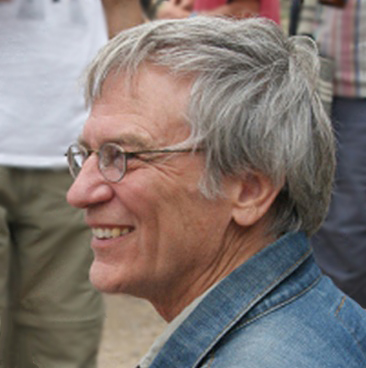 Richard Register
Richard Register


 Biographies
Biographies


 Albert Schweitzer (14 January 1875 – 4 September 1965) was a Franco-German (Alsatian) theologian, organist, philosopher, physician, and medical missionary. He was born in Kaysersberg in the province of Alsace-Lorraine, in the German Empire. Schweitzer challenged both the secular view of Jesus as depicted by historical-critical methodology current at his time in certain academic circles, as well as the traditional Christian view, depicting a Jesus Christ who expected and predicted the imminent end of the world. He received the 1952 Nobel Peace Prize for his philosophy of "
Albert Schweitzer (14 January 1875 – 4 September 1965) was a Franco-German (Alsatian) theologian, organist, philosopher, physician, and medical missionary. He was born in Kaysersberg in the province of Alsace-Lorraine, in the German Empire. Schweitzer challenged both the secular view of Jesus as depicted by historical-critical methodology current at his time in certain academic circles, as well as the traditional Christian view, depicting a Jesus Christ who expected and predicted the imminent end of the world. He received the 1952 Nobel Peace Prize for his philosophy of " Thomas Berry, C.P. (November 9, 1914 – June 1, 2009) was a Catholic priest of the Passionist order, cultural historian and ecotheologian (although cosmologist and geologian — or “Earth scholar” — were his preferred descriptors).
Thomas Berry, C.P. (November 9, 1914 – June 1, 2009) was a Catholic priest of the Passionist order, cultural historian and ecotheologian (although cosmologist and geologian — or “Earth scholar” — were his preferred descriptors). Guru Nanak
Guru Nanak 
 Sabanci Foundation's "Turkey's Changemakers" TV program shares inspiring stories of individuals who make a difference in social and economic development.
Sabanci Foundation's "Turkey's Changemakers" TV program shares inspiring stories of individuals who make a difference in social and economic development.  Christopher Alexander (born October 4, 1936 in Vienna, Austria) is an architect noted for his theories about design, and for more than 200 building projects in California, Japan, Mexico and around the world. Reasoning that users know more about the buildings they need than any architect could, he produced and validated (in collaboration with Sarah Ishikawa and Murray Silverstein) a "pattern language" designed to empower anyone to design and build at any scale. In 1958 he moved from England to the United States, living and teaching in Berkeley, California from 1963. He is professor emeritus at the University of California, Berkeley. Now retired (though ceaselessly active), he is based in Arundel, Sussex, UK.
Christopher Alexander (born October 4, 1936 in Vienna, Austria) is an architect noted for his theories about design, and for more than 200 building projects in California, Japan, Mexico and around the world. Reasoning that users know more about the buildings they need than any architect could, he produced and validated (in collaboration with Sarah Ishikawa and Murray Silverstein) a "pattern language" designed to empower anyone to design and build at any scale. In 1958 he moved from England to the United States, living and teaching in Berkeley, California from 1963. He is professor emeritus at the University of California, Berkeley. Now retired (though ceaselessly active), he is based in Arundel, Sussex, UK. CV of Professor Muhammad Yunus
CV of Professor Muhammad Yunus Johnny Dolphin is the nom de plume of John Allen - explorer, author, poet, playwright, scientist, - in 1963 he gave up his New York international project development career to make a two year journey around the world living with the legendary avant-garde and Berber scene in Tangiers, Morocco, then continued dressed as an Arab hiking and hitch-hiking across N. Africa to the Pyramids and Karnak to study the origins of civilization. Deciding to move toward the tribal areas and explore the area of the origins of humanity, he traveled up the Nile, with tribal chiefs and shaman from the South Sudan to Lake Victoria, then journeyed on through Uganda, Kenya, to the sacred Zambezi, then returned north to stay in Swahili Mombasa before taking third class passage with refugees to the Rann of Kutch. From there he wandered through the physical and metaphysical realms of Hindu Karma yogins and Tibetan Lamas. Then he encountered America again working as a stringer to a foreign correspondent and in a hospital on the Ho Chi Minh trail. Though he had published some poetry before, he emerged as an accomplished author with the first book of his authoritative Novel of the Sixties, "Thirty-Nine Blows on a Gone Trumpet". Since then, he has chronicled a personal and social history of the essence of the places he has been through novels, poetry, short stories and plays.
Johnny Dolphin is the nom de plume of John Allen - explorer, author, poet, playwright, scientist, - in 1963 he gave up his New York international project development career to make a two year journey around the world living with the legendary avant-garde and Berber scene in Tangiers, Morocco, then continued dressed as an Arab hiking and hitch-hiking across N. Africa to the Pyramids and Karnak to study the origins of civilization. Deciding to move toward the tribal areas and explore the area of the origins of humanity, he traveled up the Nile, with tribal chiefs and shaman from the South Sudan to Lake Victoria, then journeyed on through Uganda, Kenya, to the sacred Zambezi, then returned north to stay in Swahili Mombasa before taking third class passage with refugees to the Rann of Kutch. From there he wandered through the physical and metaphysical realms of Hindu Karma yogins and Tibetan Lamas. Then he encountered America again working as a stringer to a foreign correspondent and in a hospital on the Ho Chi Minh trail. Though he had published some poetry before, he emerged as an accomplished author with the first book of his authoritative Novel of the Sixties, "Thirty-Nine Blows on a Gone Trumpet". Since then, he has chronicled a personal and social history of the essence of the places he has been through novels, poetry, short stories and plays.